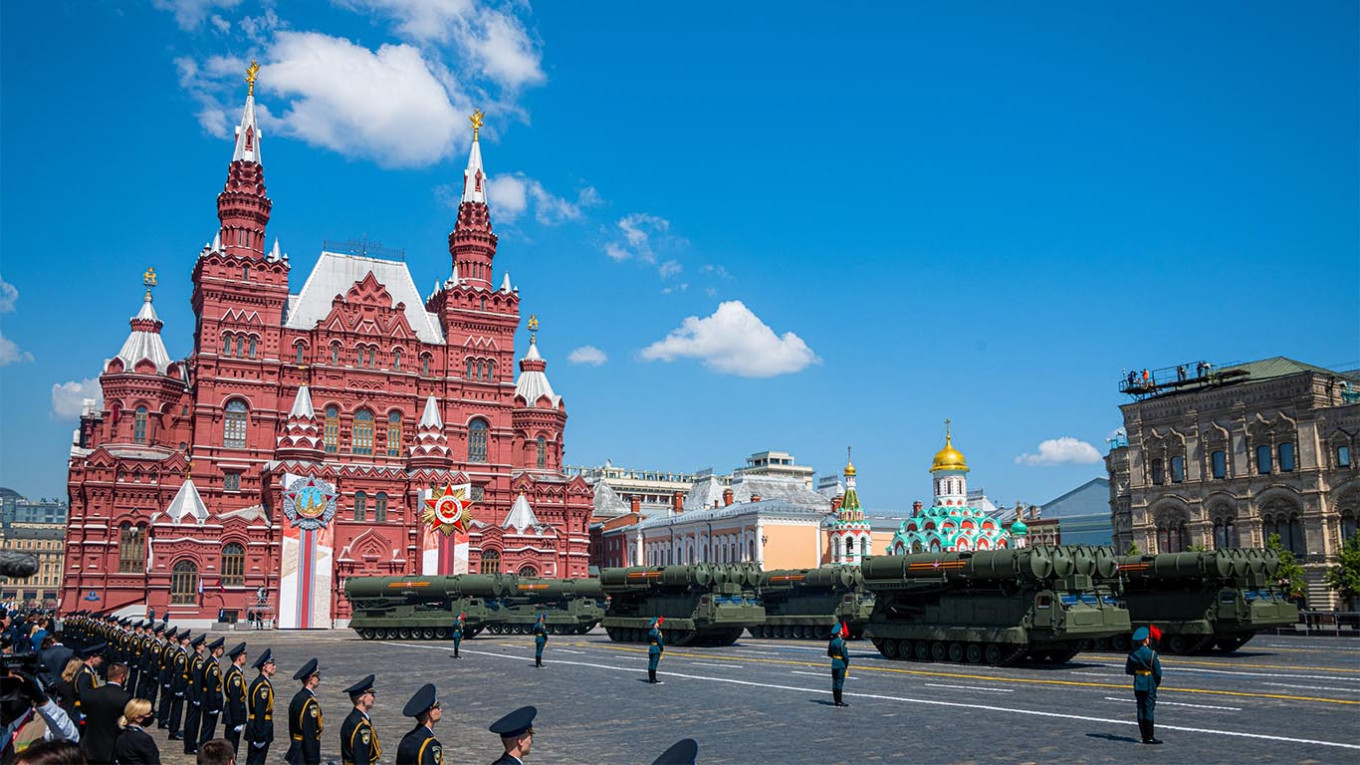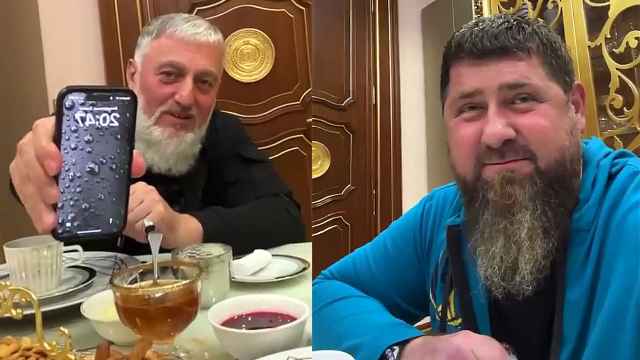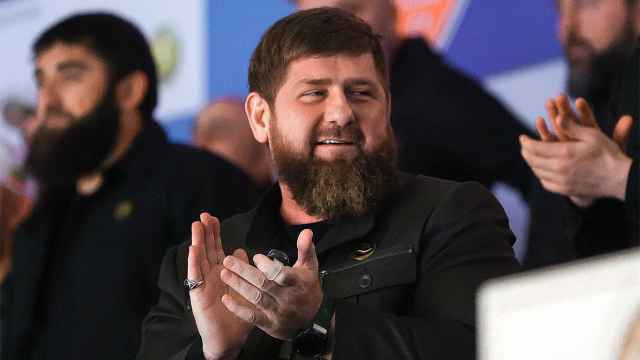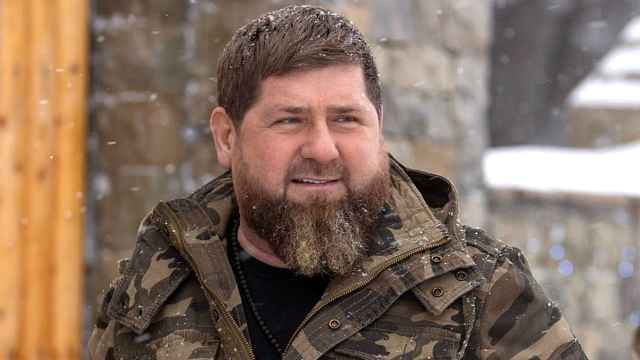Russia does know how to put on a parade. The series ranks of soldiery in lockstep; the squeaking and rumbling armored vehicles; the swelling martial music and massed “ura!” cheers; the flypast, in a chemically-guaranteed, brilliant sky. This year’s postponed Victory Day parade lacked none of the usual style, but context is all.
The purpose of the parade, after all, is not just as a reminder of wartime triumphs and wartime sacrifices but the keystone for a much wider celebration of patriotism, a chance to celebrate something that for most is still a genuine national achievement. Meanwhile, it is an opportunity for some drumbeat diplomacy, seeking soft power through invitations and receptions to former allies and enemies alike.
At the start of this year, with the 75th anniversary of the Great Patriotic War providing a suitable milestone, with the presence of France’s President Macron and China’s Xi Jinping expected and Britain’s Prime Minister Johnson, Japan’s Shinzo Abe and America’s Donald Trump hoped-for, this looked as if it would break some of the post-Crimean diplomatic permafrost. Combined with the constitutional vote set for 22 April, this would in effect be a secular coronation for Putin.
Then came coronavirus.
A Parade without a Day
Reminders of past glories are all very well, but when juxtaposed with current problems then the effect can be more poignant than anything else. In order to hold the parade, soldiers had to be confined to barracks and tested beforehand, the veterans who attended had to be quarantined, and many cities initially told to hold similar events, refused or postponed further precisely because of a fear of contributing to the spread of the virus.
In fairness, Russian TV does tend to do a first-rate job of covering the event, with cameras in cobblestones, on tanks and under drones. But that’s not the point. For Putin, standing amidst the glitteringly-medalled generals and veterans, feeling Red Square’s foundations thrum under the boots and tracks of his military, the parade is presumably the epitome of Victory Day.
What makes it work, though, is that it is just a part, even if a large one, of a whole day of spectacular, participatory patriotism. Martial music plays from loudspeakers in the streets and the metro, people take selfies in front of tanks patiently waiting for their moment in Red Square, children hand veterans flowers, old and young sport the traditional pilotka sidecaps and the newly-reinvented orange-and-black St George’s ribbon. It is predictable, mawkish, and thoroughly delightful and effective.
The parade is Putin’s; the day is Russia’s.
This, though, was a parade without (largely) the day, especially in the courtyards and sidestreets. Moscow’s Mayor Sobyanin — who seems to have been dragooned into approving the event — even pleaded with Muscovites to stay home and watch the event on TV. A few flags and billboards do not substitute for true public engagement.
It thus remains to be seen whether a parade can give Putin the kind of pre-vote nationalistic fillip for which he was presumably hoping. The fact that Putin seems not fully to appreciate how far Victory Day has to an extent outgrown the state and his own martial choreography underlines the degree to which he may be considered to be losing his connection with his people.
Empty Glories?
And perhaps also his sureness of touch in international affairs.
Of course, the parade is a salutary reminder of Russia’s rearmament. There are usually some new vehicles being debuted for the professional audience, this time including the ISDM mine-layer, but otherwise this was impressive but unremarkable.
However, some of the sharpness of Putin’s rhetoric during and before the parade sounded a little jarring.
From personal experience, Victory Day is not just genuinely popular, it is truly inclusive. I have seen awkward German tourists offered “that was then, this is now” beers, and as the token Brit in my building, I have been treated to a lengthy discourse from the doorman about the Arctic convoys that brought vital supplies (it turned out he was from Murmansk).
Without the softening influence of the wider, more inclusive public Victory Day, a certain peevish stridency was all the more evident.
After all, this comes of the heels of Putin’s widely-derided article in The National Interest which blended commonplaces about the war with factual errors and outright misrepresentations.
His speech at the parade did recognize “our allies’ contribution to the common victory, the significance of the second front that opened in June 1944,” although if one were being snippy one might wonder whether the Battle for France, the Battle of Britain, the struggle in North Africa and the invasion of Italy in 1943 had escaped this self-made historian’s attention.
Not without reason, his focus was on the way “that Nazism was crushed by the Soviet people — by millions of people of different ethnicity from all republics of the Soviet Union.” He enjoined his people to “remember that the Soviet people shouldered the main burden of the fight against Nazism… It was our people who defeated the terrible, total evil.”
The problem is, of course, with his implicit claim that great power status — which means a certain authority over the neighboring states of the “Near Abroad” — as a birthright bought by the blood of the war dead.
The two, of course, are in no way connected. The Soviet war dead — which includes Ukrainians and Georgians, after all — can and should be honored and remembered. Putin is right that, in the final analysis, Hitler’s war machine was broken on the Eastern Front.
However, that does not grant today’s Russia any special claim, any more than it allows Ukraine to assert hegemony over Romania. Sovereignty is sovereignty, and it is no more appropriate for a state to claim special privilege based on past exploits than it is for one to claim then based on present power.
After all, the limits of Russia’s present strength were evident in the supporting cast Putin could assemble. No Macron, no Xi, no Johnson, no Trump. Amongst the foreign soldiers in the parade were small contingents from China and India, but none of the heavyweight leaders were there. With all due respect for Belarus’s Alexander Lukashenko and Uzbekistan’s Shavkat Mirziyoyev, they are decidedly the B-list, and while at 1.99m, Serbia’s Aleksandar Vucic loomed over his fellow heads of state, height is not the same as might.
In this context, in this respect as well, it may prove that Putin got his parade but ended up conveying the opposite message than his original, triumphalist expectations.
A Message from The Moscow Times:
Dear readers,
We are facing unprecedented challenges. Russia's Prosecutor General's Office has designated The Moscow Times as an "undesirable" organization, criminalizing our work and putting our staff at risk of prosecution. This follows our earlier unjust labeling as a "foreign agent."
These actions are direct attempts to silence independent journalism in Russia. The authorities claim our work "discredits the decisions of the Russian leadership." We see things differently: we strive to provide accurate, unbiased reporting on Russia.
We, the journalists of The Moscow Times, refuse to be silenced. But to continue our work, we need your help.
Your support, no matter how small, makes a world of difference. If you can, please support us monthly starting from just $2. It's quick to set up, and every contribution makes a significant impact.
By supporting The Moscow Times, you're defending open, independent journalism in the face of repression. Thank you for standing with us.
Remind me later.








